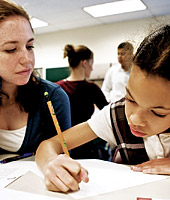Can Reconciliation Be Taught?
2008 course development grants

At Seattle's Zion Preparatory School, SPU pre-service teachers are learning to "co-teach" literature with their students. |
Pre-service teachers in Assistant Professor of Curriculum and Instruction Kristine Gritter’s class “Children’s Literature” increased their intercultural competency during Autumn 2008. They learned that children and young adolescents are capable of sophisticated literary insight, and can in effect function as “co-teachers” when it comes to engaging with the text.
This is particularly significant when the children — and the literature — represent diverse ethnic traditions. “When the life experiences of minority students are valued by teachers, these exchanges restore humanity to populations that have been robbed of respect,” explains Gritter. She hopes that as a result of their experience more new teachers will choose to work in inner-city and ethnically diverse schools.
Such an approach to learning is a key component of Seattle Pacific University’s institutional commitment to reconciliation. This year, students in academic disciplines as varied as education, psychology, and music are benefiting from enhancements to the curriculum made because of Reconciliation Course Development Grants awarded by the Office of Academic Affairs in partnership with the Faculty Committee on Diversity and the Center for Scholarship and Faculty Development (CSFD).
“If we are serious about our biblically based commitment to reconciliation and diversity, it is crucial that these issues be addressed in the curriculum, the heart of any university,” says Susan VanZanten, professor of English and director of the CSFD.
Seven SPU faculty members received grants of $500 to $1,500 for courses being offered during the 2008–09 academic year. The courses “teach” reconciliation and intercultural competency, says VanZanten, by providing role models, cultivating empathy, and requiring practice through experiential service-learning activities. “Information can be taught,” she explains, “but virtues — such as reconciliation — are formed best through example and by doing.”
The other six courses for which grants were awarded include “Christianity and Society,” taught by Assistant Professor of Theology Daniel Castelo; “Context Studies: Pacific Rim/Spice Route,” taught by Professor of Music Education Ramona Holmes; “Cultural Communication,” taught by Assistant Professor of Communication Lorelle Jabs; “Middle Eastern Literature,” taught by Associate Professor of English Kimberly Segall; “A Force More Powerful: Non-Violent Movements of Social Change,” taught by Professor of History Don Holsinger; “Contemporary Issues in Physical Science Education,” taught by Professor of Physics Stamatis Vokos; and “Understanding Our Hidden Wound,” taught by Assistant Professor of Psychology Baine Craft.
“Can reconciliation be taught in the classroom?” asks Craft, whose course examines the wounds caused by prejudice and racism. “Reconciliation is relational, and it takes a lifetime to learn how to relate to others. But by exploring differing worldviews and the ways in which individuals have attempted reconciliation in the past, students gain a framework for reconciliation in their own lives.
“I’ll consider the course a success if they leave with a desire to know themselves and others better, and a renewed hope for reconciliation in relationships they thought were hopeless.”
—Photo by Daniel Sheehan
Return to top
Back to Campus Home
|